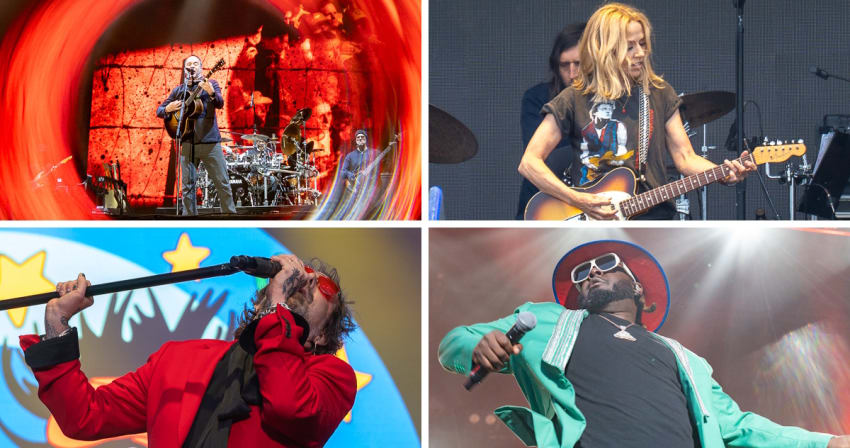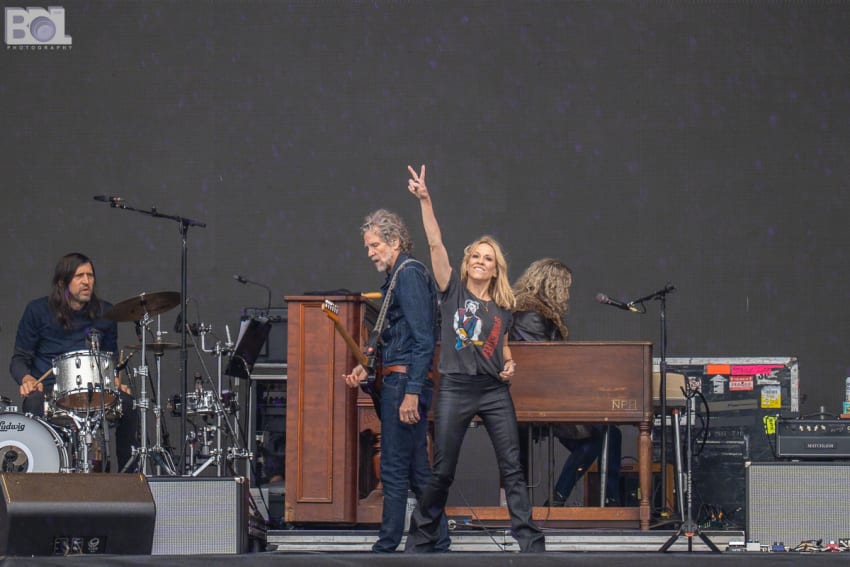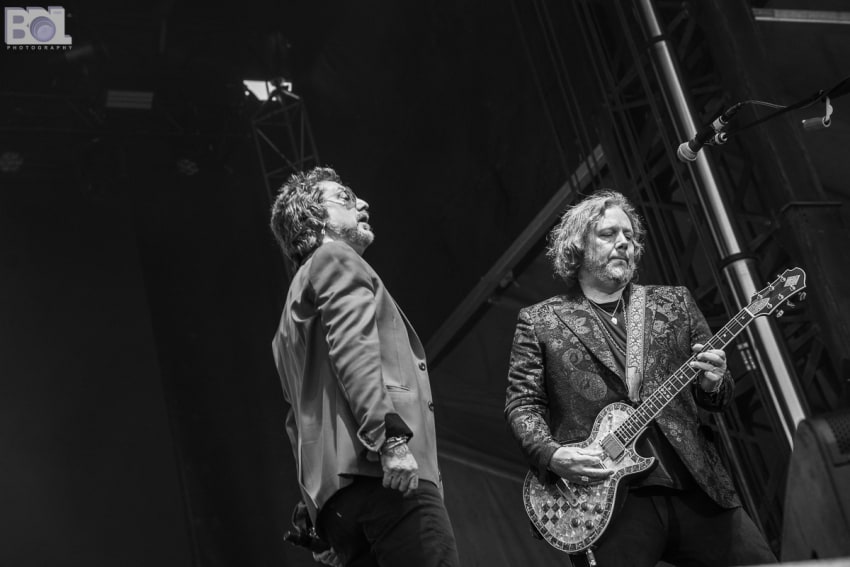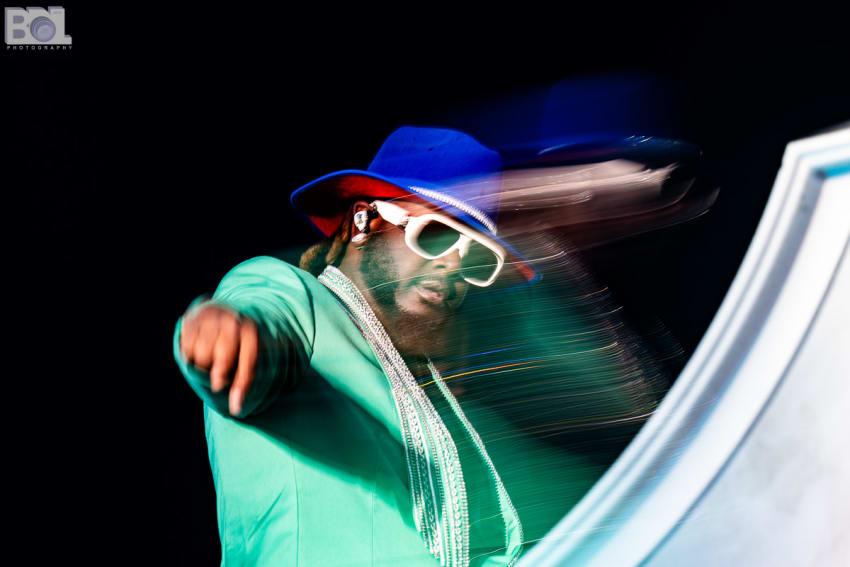Boston Calling 2025 Review: Highlights & More From Harvard Athletic Complex
Andrew Bruss recaps this year’s event at Harvard Athletic Complex alongside photos by Bryan Lasky.
By Andrew Bruss May 27, 2025 • 1:53 pm PDT
Memorial Day came and went and that means the latest iteration of Boston Calling took place at the Harvard Athletic Complex: Three days of +50 acts performing across four venues, showcasing a vast spectrum of talent, ranging from the iconic, the established, up-and-coming, the local and in the case of acts performing in The Arena, still at Berklee College of Music.
There were big changes for the layout of the festival. After a few years absence following Covid, Boston Calling once again opened up the Bright-Landry Hockey Center, dubbed The Arena, and where in years past they’ve used the space to host everything from stand-up comedy to a film festival hosted by Natalie Portman, this time around, The Arena showcased jazz acts enrolled at, and curated by, Berklee College of Music.
Advertisement
The changes made to the Main Stage area might be the biggest logistical overhaul the event has made since it switched locations from its original home in City Hall Plaza to the Harvard Athletic Complex. Since its first year on the Crimson Campus, the festival has featured two main stages, side-by-side, allowing one act to begin immediately after the other walked off the stage.
This was fantastic from a programming standpoint, but in recent years, as crowds have grown, it’s become downright dangerous and came to a head last year during a performance by Chappell Roan. Both stages had a gated in VIP area as well as barricades running from the stage to the soundboard and with vendors and platinum viewing at the audience’s back, it created a scary bottleneck that fans couldn’t get out of. When you factor in the heat that day, the result was widespread anxiety, people passing out and a dangerous concurrence of factors that thankfully did not lead to a much worse outcome.
This year, the two stages were replaced by one, three times the size. Massive viewing screens on both sides of the stage, each the size of the stage itself, made it easy to see the action from almost anywhere and greatly increased the flow of foot traffic. The stage featured a rotating platform for the bands to perform on so the next band could set up, and when it was their slot, simply rotate the platform to get going.
One of the early Main Stage highlights of the weekend was Sheryl Crow who put on a set full of hits like, “If It Makes You Happy,” “All I Wanna Do,” and a set-closing “Every Day Is a Winding Road.” An interesting song choice for the ex-girlfriend of Eric Clapton was a cover of Blind Faith’s “Can’t Find My Way Home” sandwiched in between “My Favorite Mistake,” and “Strong Enough,” when she sang the question, “are you strong enough to be my man?” In addition to guitar and vocals, Crow impressed on the harmonica and seriously knew her way around the bass.
Crow’s set had an authentic Nashville-vibe thanks to a powerful bandleader who has assembled an ensemble of consummate professionals who played off each other naturally and all got their moments in the spotlight. At one point, she took off her jacket to display a Bruce Springsteen shirt and called for The Boss to run for president in a nod to his defiant statements overseas directed at the Trump Administration.
The authentic chemistry and egoless generosity Crow displayed on stage stood in stark contrast to the performance the The Black Crowes put on to close out the Blue Stage on Saturday night across the grounds. Brothers Chris Robinson and Rich Robinson have always had a sibling rivalry on par with that of Oasis’ Gallagher brothers and The Kinks’ Ray Davies and Dave Davies.
The Crowes broke up in 2015 because, according to guitarist Rich, frontman Chris wanted his bandmates to be under his employ, significantly stripping power from his brother, as well as founding member and drummer Steve Gorman. Gorman confirmed this and much more in his 2019 book, Hard to Handle: The Life and Death of the Black Crowes – A Memoir. In 2019, the brothers announced a reunion, sans Gorman, that was delayed due to Covid, and promoted with some press shots in which both brothers looked absolutely miserable.
At Boston Calling, the Brothers Robinson and Co. opened with “No Speak No Slave,” and then offered “Rats and Clowns” off their 2024 release, Happiness Bastards, followed by the 1990 single, “Twice as Hard.” At first it seemed like Chris Robinson didn’t have the pipes that he used to, but then he absolutely decimated a performance of “Seeing Things,” off their first album, which put that thought to rest. What was perceived as possible vocal struggles really came down to Chris’ bizarre choice in his vocal phrasing that was almost incomprehensible.
With all this said, The Crowes did sound fantastic. The band was tight, they executed a set of fan favorites like “Thorn in My Pride,” and a set closing “Remedy” that was perfect for a festival crowd. But there was no magic. The days of guitarist Marc Ford dueling with Rich before “Thorn” are long gone and while Nico Bereciartua got his moment to solo while Chris directed the audience’s attention toward him, it felt like Bereciartua was playing on the shortest leash of any of the four guitarists I’ve seen play alongside Rich in The Black Crowes.
The night prior, T-Pain closed down the same stage, performing off a list of iconic, chart-topping hits that brought the millennials in the crowd back to their college days. On a lot of these tracks, T-Pain was a featured guest and they weren’t really “his songs,” but with a DJ in tow he’d rap his part and endlessly entertain his audience with his showmanship during the verses.
Doing his part on the Kanye West track, “Good Life,” was a bit of a head turner given West’s recent anti-semitic and other controversial actions, but the crowd was into it and seemed to vibe with the notion that a banger is a banger. T-Pain was the most charismatic performer of the weekend and was someone you couldn’t take your eyes off. What disappointed was that his performance lacked the live band he’s been touring with as recently as Coachella and Stagecoach. He’s got an incredible ensemble and famously performs a cover of Black Sabbath’s “War Pigs” that Ozzy Osbourne called better than the original and as much fun as folks had bouncing along to the songs they know and love, it was disappointing that he didn’t put on the kind of show he did just weeks ago at those aforementioned events.
Remi Wolf was a set a lot of people had their eyes on. In case her bona fides as A Big Deal weren’t already enough, it was announced that Bonnaroo is putting on “Remi Wolf’s Insanely Fire 1970’s Pool Party Superjam.” Unfortunately for Wolf, her set at Boston Calling was a disaster she bears no responsibility for. Out of the gate, when she sang into the microphone, every other word cut off. They switched her mic out on the fly multiple times to no avail and eventually she did her best to banter with the crowd about bandmate nicknames and using ChatGPT for therapy, but by the time they got things going, 20 minutes had passed and it was clear that throughout the entirety of her performance, she couldn’t hear what she was singing.
She told the crowd on more than one occasion they were having continued technical difficulties and in the saddest onstage moment of the weekend, she ended her set by saying, “My name is Remi Wolf and I’m sorry.” Sublime took the stage next and had ear monitor issues as well, demonstrating it was not the fault of Wolf’s team. She’s a high profile act a lot of people were looking forward to and the lack of technical excellence from the event’s sound team during Wolf’s performance was far below the standards ticket holders fairly expect from an event of this cost.
Headliners Luke Combs, Fall Out Boy and Dave Matthews Band are all so different from one another that each day drew a sizable crowd of single-day ticket holders showcasing wide-scale fashion choices singular to the day of the weekend. Saturday’s back to back Main Stage performances by Fall Out Boy and Avril Lavigne invited throngs of millennials eager to squeeze back into their brightly colored aughts-era Hot Topic duds and eye-popping hair and makeup styling. The day prior, the same timeslots on the main stage went to pop country stars Megan Moroney and headliner Luke Combs. Moroney and Combs noticeably drew festivalgoers donning cowboy hats and boots, as well as others wearing American flag accessories, militant attire and nationalistic symbols.
On Sunday night, Dave Matthews Band closed down the event with a two hour set on the main stage and to say the least, Dave understood the assignment. The set was like a wishlist for the casual fan, perfect for a festival crowd, and featured songs like “Tripping Billies,” “Crash Into Me,” “So Much to Say,” “What Would You Say,” “Ants Marching” and ended with a performance of “Don’t Drink the Water.” Something you really appreciate seeing Dave Matthews in the flesh that you might not account for on his studio work is how fantastic a rhythm guitar player he is.
Guitarist Tim Reynolds was on hand to do the heavy lifting but Dave has a glistening tone that comes out through his right hand and the riffs to these classic songs required his left hand to constantly be in motion, both changing chords and augmenting them in a way that inadvertently resulted in the stage-sized screens giving the audience an intimate tour of Dave’s fretboard.
While hearing “Crash Into Me” live was for sure a bucket list item not everyone had previously known they needed to check off, the absolute highlight of the night was Dave’s famed cover of “All Along the Watchtower.” It starts out slow, and solo, with a brief but thunderous bar from his band just every so often and from there, things went into a full on rock rendition that was the best vocal performance Dave gave throughout the night.
Somehow “Watchtower” turned into “Stairway To Heaven,” as Reynolds nailed the guitar solo and Dave proved up to the task of belting out Robert Plant’s iconic vocal part. To perform any part of “Stairway” live in a way that isn’t lame takes an absolute miracle and in this case, that miracle came in the form of drummer Carter Beauford and bassist Stefan Lessard. This powerhouse rhythm section was tighter than a snare drum and proved that while the soul of the Dave Matthews Band is in its frontman, the rhythm section is its beating heart.
In the past, Boston Calling has been graced with weather that can only be described as next-to-perfect. This wasn’t one of those times. Cold and cloudy all weekend long, it rained for six hours on Friday and parts of Saturday. While the weather was a bust, it didn’t require the site to be evacuated, which has happened a few times in the past. The new layout made the grounds feel far more fluid and demonstrated that promoters listened carefully and acted with urgency to the safety concerns of fans and First Responders. They say Safety Comes First and Boston Calling put that to practice this year.
With eyes on 2026, the event finds itself at a crossroads as it considers its booking philosophy and what kind of festival they want Boston Calling to be. But judging by a long history of successfully reading the room and making the necessary adjustments, Memorial Day 2026 is a weekend to circle on the calendar for everyone who loves to Go See Live Music.








